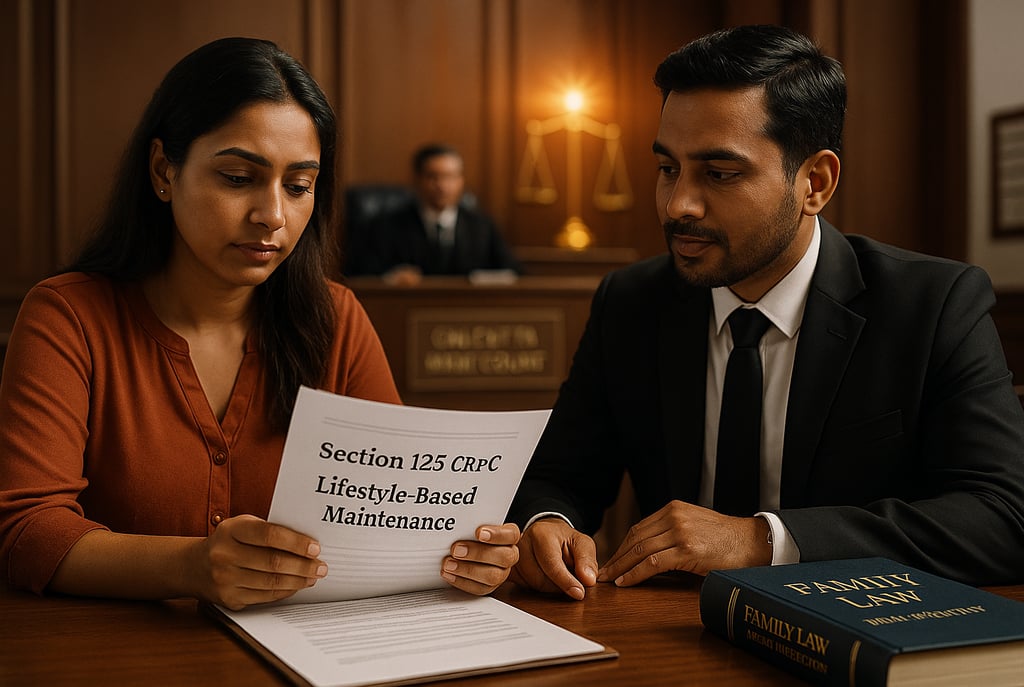"Lifestyle, Not Leftovers": Calcutta High Court Redefines Maintenance as a Right to Dignity — Not Mere Survival
In a bold shift from traditional norms, the Calcutta High Court repositions Section 125 CrPC maintenance as a tool to preserve lifestyle stability, challenging outdated ideas of spousal support. What does this mean for the future of matrimonial rights in India?
Adv Sachin Gupta | Partner | Altius Astra Attorneys
7/21/20253 min read


Lifestyle-Based Maintenance: A Landmark View from the Calcutta High Court
In a progressive ruling that reshapes the concept of spousal support in India, the Calcutta High Court has clarified that maintenance under Section 125 of the Criminal Procedure Code (CrPC) is not simply a measure of survival, but a means to ensure a lifestyle comparable to what the spouse enjoyed during marriage. This landmark observation is poised to influence divorce and maintenance cases across India—including Delhi, where such matters are routinely handled before Family Courts, Rohini Court, and Tis Hazari Court.
The Changing Face of Maintenance Law in India
In Tumpa Basak vs. Tufan Basak, the Calcutta High Court acknowledged a growing trend: the purpose of maintenance has evolved from basic sustenance to preserving the dignity and standard of living of the dependent spouse. Justice Bibhas Ranjan De observed:
“There has been a drastic shift in societal dynamics concerning marital obligations. Maintenance is no longer a handout—it is a means to sustain lifestyle stability. It is not compensation for separation, but a continuation of a life once shared.”
This pronouncement is highly relevant in the context of Delhi, where spousal maintenance cases often involve significant financial disclosures, contested facts, and emotionally charged arguments.
Background of the Case – Maintenance Reduced, Then Challenged
The wife in the case had originally been granted ₹30,000 per month as maintenance under Section 125 CrPC. However, after the husband’s retirement, he filed a petition under Section 127 CrPC seeking a reduction. The Magistrate allowed this and reduced the maintenance to ₹20,000 per month. Both parties challenged this order in separate revision petitions.
Wife's Argument: Maintenance should not be reduced simply due to retirement; the husband's actual earning capacity and lifestyle expenditures (like employing a driver) indicate he can afford more.
Husband's Argument: He claimed diminished income post-retirement and argued that his wife has hidden financial assets and that their adult son is now self-sufficient.
Key Legal Observations by the Calcutta High Court
The court took a detailed and realistic view of modern financial practices and judicial precedents. The judgment offers several important takeaways for matrimonial law practitioners in Delhi.
Income Tax Returns are not Absolute Proof of Income:
The court held that income tax returns cannot be the sole determinant of a person's financial status in maintenance proceedings:
“I.T. returns are based on self-declared income and can easily be manipulated or underreported. Courts must consider past earnings, potential income, lifestyle expenses, and overall financial capacity.”
Holistic Financial Assessment of Spouses are Vital
Courts must move beyond static figures. They should:
Evaluate earning potential and not just current income
Consider unreported assets or income streams
Account for the standard of living enjoyed during marriage
Factor in cost of living and inflation
Impact on Women’s Rights & Legal Obligations of Husbands
The judgment reiterates that maintenance is a legal right, not a charitable act. Women who have dedicated years to managing the household are entitled to maintain their standard of living after separation.
“Any financial settlement must consider the actual living standards and the impact of inflation. A homemaker deserves stability, not deprivation, post-separation.”
This statement resonates with ongoing advocacy in Delhi courts for gender-sensitive interpretations of Section 125 CrPC, and supports the cause of women’s economic dignity.
Final Verdict of Calcutta High Court “Lifestyle Centric Maintenance with Inflation Adjustment”
The High Court set aside the lower court’s reduction and directed the husband to:
Pay ₹25,000 per month as revised maintenance
Include a 5% increment every two years to adjust for inflation
This ensures that the maintenance order remains relevant and sustainable over time, a concept increasingly gaining traction among top matrimonial lawyers in Delhi.
Conclusion: A New Era of Maintenance Jurisprudence
The Calcutta High Court’s judgment in Tumpa Basak v. Tufan Basak (2025 LiveLaw Cal 175) is a landmark step toward a modern and just interpretation of spousal maintenance. For families navigating divorce, separation, or ongoing maintenance battles in Delhi NCR, this ruling sets a persuasive precedent.
Altius Astra Attorneys
A premier law firm based in Delhi, India, offering legal representation across various practice areas for citizens rights and interests.
© 2025. Altius Astra Attorneys. All rights reserved.
Contact Us
📞 9899290789, 9818786756
📧 contact@altiusastra.com
3C-ED Block, Madhuban Chowk, Pitampura, Delhi-110034
DISCLAIMER
